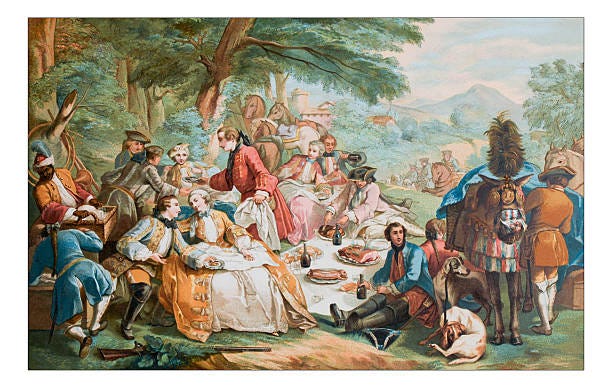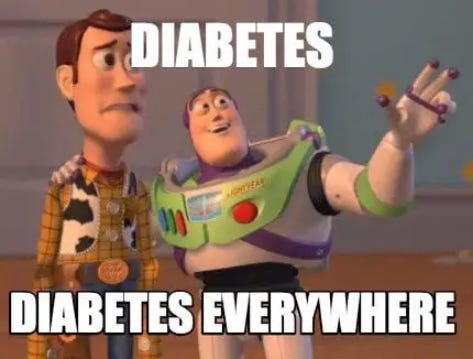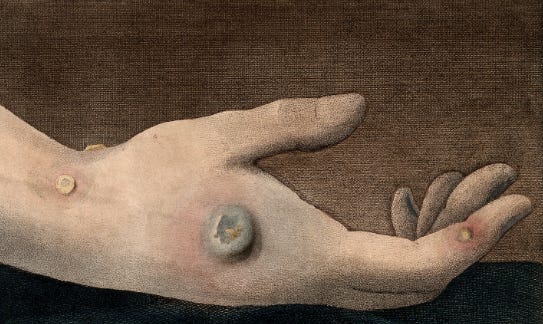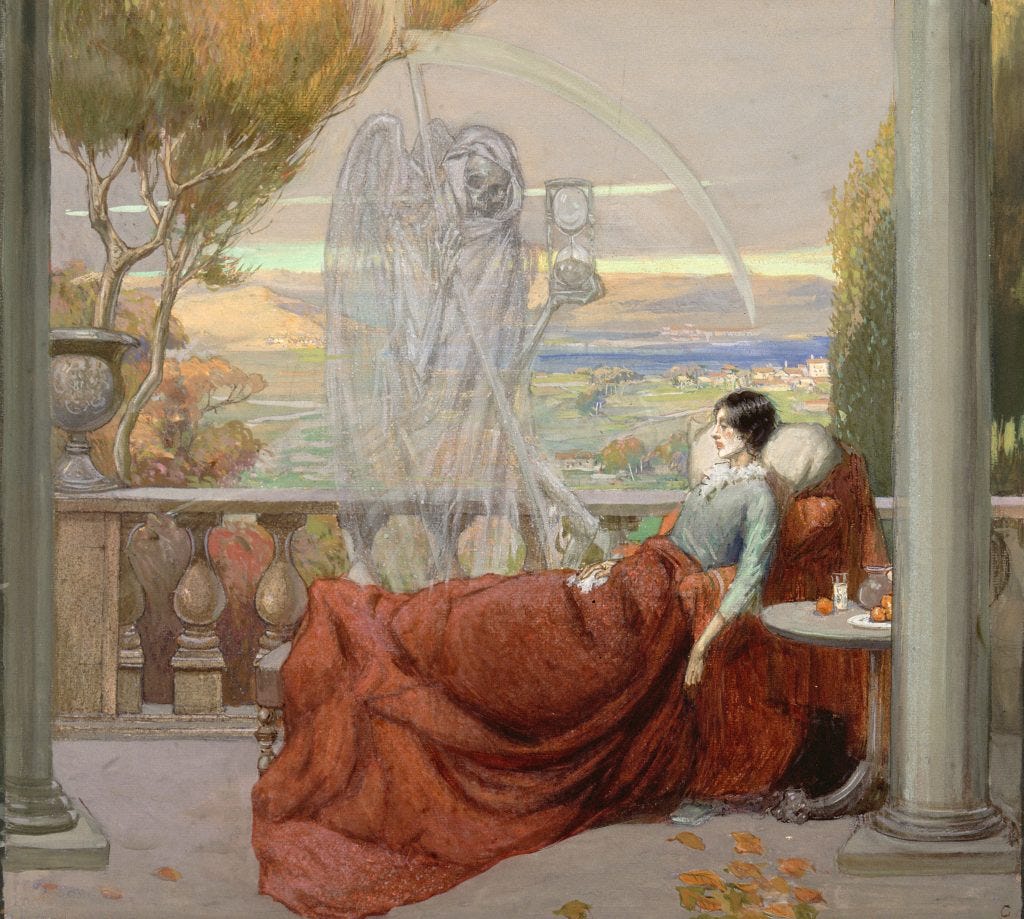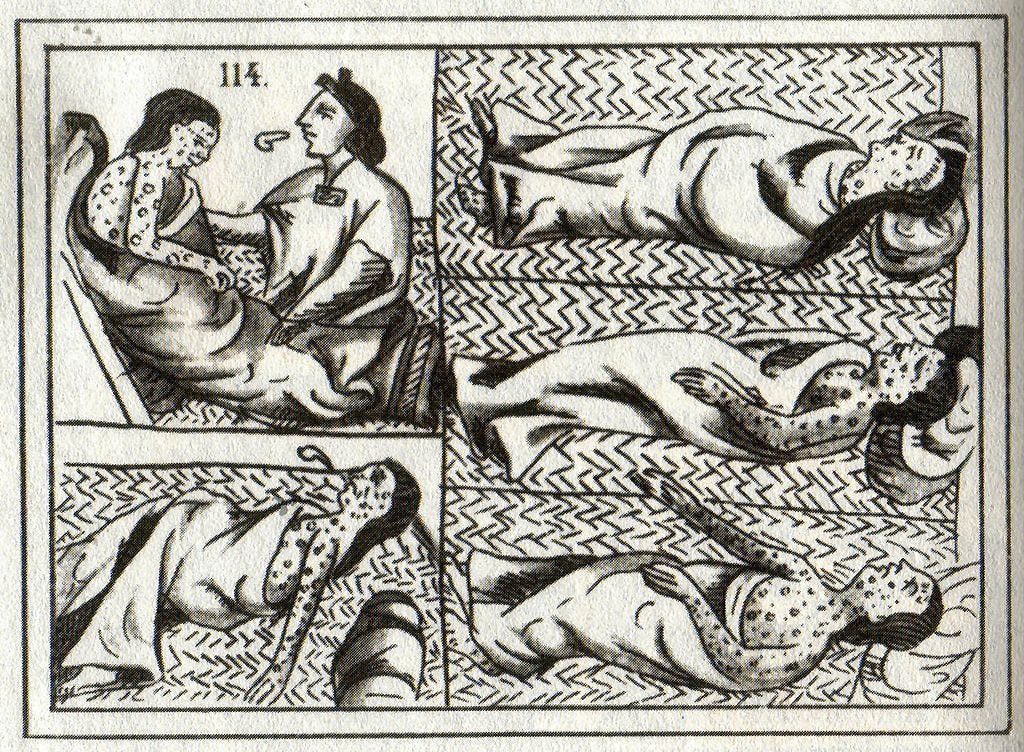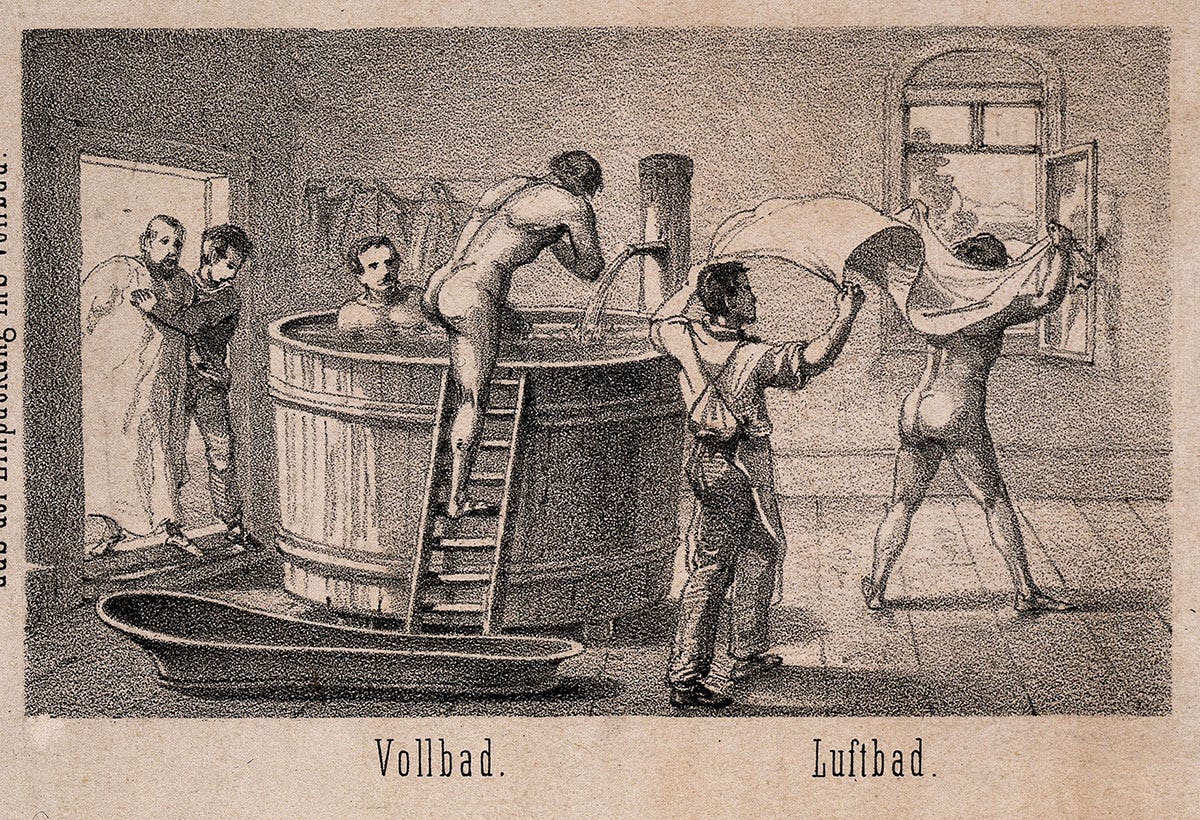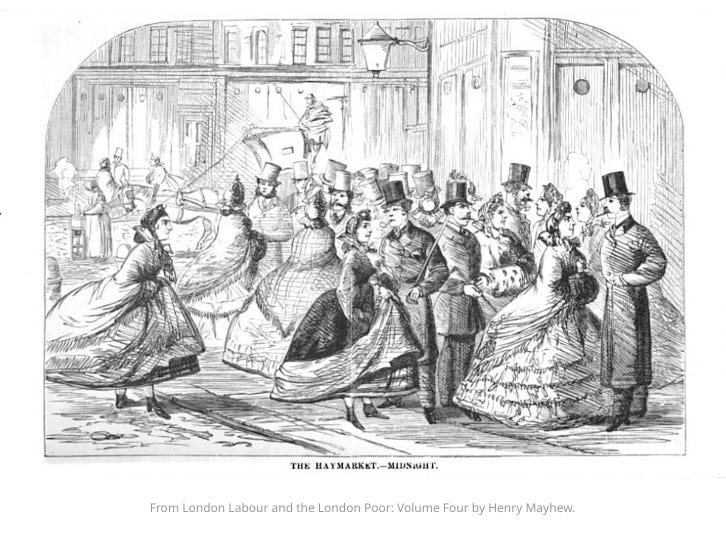Yesterday I had a rare chance to stop by one of my favorite chain thrift stores. As Murphy’s Law would have it, I was sifting through racks of short sleeved shirts when a revolting, sour stench wafted through the air and curled my nose hairs. It wasn’t so much of a scent as it was a violent assertion — I AM HERE AND YOU WILL NOTICE ME AND ONLY ME. The odor was urine, feces, and something far worse: rot. The smell of suppurating, decaying flesh, old blood and pus, and urine soaking an eldritch, dripping diaper was obscene and beyond mere language to adequately describe. The source of the stench was an old woman who was apparently alone standing fifteen feet away. She was disheveled and seemingly unaware of her own state. I went to a different section of the store, which is quite large. The smell followed me as if it was trying to infect me too, bursting unexpectedly out of clothes she had touched. Waves of decay bounded forward through the store with invisible, unfurling tentacles, seeking new senses to offend. She could be smelled from fifty feet away. I am confident that every person in the store smelled her. I feel sorry for the employees who not only would be forced to personally interact with her but also who would smell her stench hours after she left. Fortunately for me, I was able to leave the confines of the store, though sadly neither I nor any other customer got much shopping done.
Bad smells are typically more pungent to women, who are more sensitive to the etheric plane. For this reason, it is more common for a man to neglect himself into a state of reek, though I have smelled my fair share of women like the one above. If I had to use one word to encapsulate the way the woman smelled, it would be “neglect”. As much as her etheric assault irritated me and likely others in the store, I think we all tacitly acknowledged how very sad it was that she was clearly not a person who had loved ones to care for her. As she shuffled around perusing sale items, questions rose in my mind: How did she get to the store? Did she drive herself? Does she know she smells that bad? Isn’t she in pain from the urea burns and the open wounds down there?
I have yet to know an elderly person who doesn’t spend the end of his or her life waging a battle with incontinence. Obviously the woman in the thrift store had long since lost the battle — I can imagine the poor store employees had to clean up a dripping mess from the floor once she left. I hope that did not happen. I didn’t step in anything that I knew of so perhaps she was in a fairly dry state.
How it happens: the demise of the urinary tract
When I was a child, I was able to go six hours without having to pee. When I did pee, my urine stream was robust and strong. This trend did not reverse until I became sexually active in my late teens, and from then on, it all went to hell in a hand basket. Frequent urinary tract infections meant I had to urinate often within a few minutes of seemingly having emptied my bladder. Any kind of action down there resulted in a UTI, and my obsession with condoms triggered a lifelong latex allergy. Not wanting to become pregnant, I found that I had a choice: constant UTIs that I sporadically went on antibiotics to ameliorate or no sex at all, which meant no boyfriend as those two things went hand in hand.
My urinary tract, despite being relatively healthy compared to most people my age, is never going to be as solid as it was when I was seven years old. Living life to its fullest wrecks the urinary tract: this is just a fact we humans have to put up with. Men end up losing continence to prostate issues. According to the American Cancer Society, eleven percent of men end up with prostate cancer. I would guesstimate the number is actually much higher. When the prostate has problems, it exhibits itself through urinary frequency. The same thing happens to women sans prostate, especially if they have gone through childbirth. Even women like me who have borne no children end up with problematic urinary tracts.
The medical profession: nothing to see here!
Of course modern allopathic medicine has zero solutions to chronic urinary problems. A dear friend of mine who is approximately old enough to be my mother suffers from the belief that her doctors have her best interests in mind. My father suffered from the same belief and luckily his decline was fast compared to most. His relatively swift demise in his mid-eighties did not save him from spending hundreds of thousands of dollars in the name of saving his “health” via allopathic treatments. My friend is going the same route, but because women typically linger in pre-death states longer than men, it is likely she will suffer far more than my father and be roped into larger outlays of resources as age takes its toll.
Just think for one second of how the tremendous assets of the Boomers could have benefited society if they had not been spent on various medical triage in old age. Had Boomers possessed the grace to forgo stupid and brutal medical treatments that were hardly life-saving, such as vaccinations, the biopsy/surgery mill and endless “wellness” scans that invariably ended in a bevy of pills and shots, perhaps there would have been money leftover for the average young person to afford a modest home and a decent living from a job that did not involve the medical profession in any way, shape or form. All of this stuff is connected, but I digress.
The thing is about believers in allopathic medicine is they cannot be led to alternatives to allopathic medicine, much like a proverbial horse to water. The facts on the ground are that allopathic treatments do nothing to support the urinary tract. All allopathic treatments, including antibiotics, lead to a soggy diaper lifestyle and there are no plans to correct course. My friend is on a type of pill that numbs the urgency to pee and stains the urine bright orange. I have taken this pill before and though it is said not to have side effects, it has plenty of them. Every time I take it for more than a few days, I end up with a weird form of pinkeye and flareups of cystic acne. What this means is that the orange pee pill is causing inflammation, and I will bet it is doing the same in my friend though she is loathe to admit it. Despite it flat out no longer working, she takes a hefty dose of the orange pee pill every night. Like other allopathic “remedies”, the orange pee pill does absolutely nothing to address the root of the problem, which is the health of the urinary tract or the lack thereof.
Care and maintenance of the system
In order to save the urinary tract, you have to maintain it. For some, this may mean periodic celibacy. Another friend of mine in her forties is plagued by autoimmune disease and despite great diet and exercise habits, she has pee problems that are a straight road to incontinence. She is not willing to be celibate for longer than one or two days, so her problems will likely continue.
Urinary function is intimately tied to bowel function. If you’re not crapping once or more times a day, you probably have urinary woes. Constipation is a silent killer and it is a terrible way to go (or not to go), especially in older people. Allopaths shrug and prescribe laxatives and sometimes surgery; that is their “solution” to constipation. Nope. Number one, if you are constipated, you need to be more active, full stop, and the more frequently and vigorously you can get your body moving, the better. Stretching, calisthenics, and yoga are also great movers of energy in the body that help you to poop. The internet has a gazillion stretches and yoga moves you can do to help move your body’s energy towards happy pooping. Investigate hip-opening stretches and anything designed to increase flexibility. Flexibility means blood flow and blood flow means pooping. This is not rocket science.
You also need to overhaul your diet. Dairy products are a huge constipation culprit. If you are constipated, try replacing cheese and ice cream with nuts and sunflower seeds and various desserts made with dates or bananas. When I have severe constipation, usually caused by stress in my case, I bake up some savory crackers made of flax and chia seeds. Fiber is your friend. Processed sweets, snacks, and meats are not. When I go to my local grocery, the pastry display is haunted by Boomers who should probably steer clear. Refined sugar causes inflammation and so does excessive fat. That said, avoiding all sugar and/or fat is a stupid idea. Apollo, god of health, said “everything in moderation” and that means tee-totaling is as boneheaded as bingeing.
It’s not just a matter of drinking more fluids, though that obviously helps. In my own case, I have found that designer sodas that contain inulin such as Olipop pretty much guarantee a crap a day… maybe they should change the name to Olipoop for truth in advertising. Massaging the belly every night works wonders for me. At some point, I suppose I will make a video on it. Abdominal massage involves applying gentle pressure on skin to stimulate the digestive tract. I use castor oil and essentially push it deep into my skin from the area of the beginning of the large colon on the right side all the way around to the left side hip.
Lastly, herbs are the secret weapon to urinary health. I have improved my own urinary tract immensely with daily intake of several herbs.
Cranberry — Even allopaths know that cranberry prevents UTI bacteria such as E.coli and staph from attaching to the urethra. Take up to four cranberry capsules (typically 500mg of powdered herb) every morning with or before tea or coffee and every night with an evening meal or snack. When your body turns fluid into pee, cranberry goes along for the ride, disinfecting the urinary hose and kicking out pathogenic bacteria before it can set up shop. D-mannose is a sugar derivative isolated from sources like apples and cranberries that is basically a more potent version of cranberry. If you have an active UTI, D-mannose pills often relieve pain within a few hours.
Stinging nettles — Every person who has frequent pee or urine issues needs to take nettles. Again, I prefer pills but if stinging nettles grew in my area, I would dry and pulverize them and drink them as nettle tea. Nettles lose their sting once dried or steamed, and are one of the most nutritious vegetables on the planet. Urinary problems are usually a sign that the diet needs to be more nutritious, and nettles are a fantastic way to address both nutritional and urinary inflammation issues at once.
Dandelion — also known as “piss the bed”, the common weed is one of the world’s oldest and well known bladder and liver tonics, which means it tones both and whips them into shape. In short, dandelions make you pee. Peeing small amounts frequently is a sign of urinary heat or inflammation. Dandelion cools the heat. Despite it increasing pee production, it ameliorates and lessens pee frequency as the pee becomes more efficient at its job of excreting waste and toxins. Dandelion is also extremely nutritious and oddly enough the little yellow blossoms are the most nutritious part of all. In my case, I absolutely love the taste of roasted dandelion root tea. It has coffee vibes and as someone who can no longer handle the amount of caffeine that even decaf coffee delivers, I find a cup of dandelion tea to be a soothing treat regardless of its health benefits.
Uva ursi — also known as bearberry, this common ground cover and woodland dweller is a powerhouse when it comes to strengthening and improving urinary function. Anytime my urine has a smell, I take uva ursi pills or tea and within a few hours, the coast is clear.
There are many, many more herbs not listed here and I would encourage anyone with urinary problems to experiment with the ones that are known to be safe even in large doses like dandelion and nettles. Every human being is vastly different and no one diet, exercise regime, or herbal supplement will be right for all. That said, the manufactured, compliant helplessness of allopathic cultism needs to end. In this age of sham doctors, and I would argue most of them are either willfully or naively ignorant about human health, we need to have an arsenal against disease so we can treat ourselves. An ounce of prevention is worth a pound of the cure. Endless, invasive tests, ineffective drugs, and expensive surgeries are a choice to a large degree. I refuse to believe a soggy diaper is an inevitable terminus in old age.
